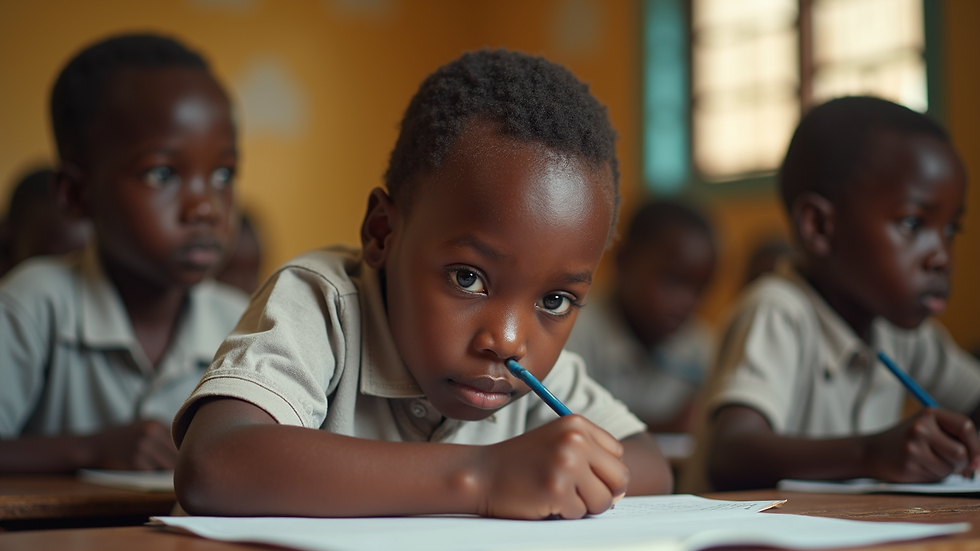Unheard Resilience: How African Orphans Overcome Adversity
- orphanstarline
- Oct 26, 2024
- 3 min read
Inspiring Resilience Among African Orphans
In Africa, millions of children face the daily struggle of living without parental care. These orphans are often left to fend for themselves due to illness, conflict, or poverty. At times, their hardships overshadow their remarkable strength and resilience. This post focuses on the stories of African orphans, shedding light on their challenges, aspirations, and how we can help them flourish.
The Reality of Orphanhood in Africa
Living as an orphan in Africa is a deeply impactful experience. UNICEF estimates there are about 18 million orphans aged 0-17 in Africa who have lost one or both parents. Many struggle to meet basic needs such as food, education, and healthcare.
Often, orphans find themselves trying to adjust to unfamiliar family structures. They may live with extended family members who lack the resources to support them. In cases where orphanages or communal living arrangements are involved, these institutions can also be stretched thin, unable to provide the necessary care.

While these realities can lead to feelings of isolation, many orphans discover an inner strength, allowing them to rise above their circumstances.
Stories of Resilience
Education as a Gateway: Divine's Journey
Meet Divine, a bright 12-year-old girl from Uganda who lost her parents to an illness. Her life changed when a local charity provided her with school supplies and a scholarship. Now, she ranks in the top five of her class, inspiring her peers to follow her lead. Education has become a lifeline for Divine, enabling her to dream of a different future.
Divine's story illuminates a broader trend. Access to quality education can help orphans break the cycle of poverty. By providing scholarships and resources, organizations can empower children like Divine to change their lives.

Community Support: The Power of Togetherness
When conventional family support falls short, community initiatives can make a significant difference. In Rwanda, for example, a group of orphans started a farming project to meet their food needs. By combining their skills and resources, they transformed a small piece of land into a thriving source of income. Not only did this provide for their basic needs, but it also fostered a sense of belonging and teamwork.
Through cooperative efforts, these children learned the importance of community. Their success extends beyond financial stability; it instills confidence, encouraging them to believe in their abilities.
Breaking Stereotypes
The narrative around orphans can sometimes be negative, painting a picture of despair. However, many African orphans defy these stereotypes and pursue their dreams. They are artists, athletes, and leaders who challenge societal expectations.
Programs that focus on arts and sports serve as essential outlets for orphans. For instance, community dance and music initiatives allow them to express their emotions while fostering lasting connections. These creative platforms not only help them cope but also encourage a sense of identity and pride.

The Role of International Aid and Local Initiatives
International organizations play a vital role in addressing the needs of African orphans, providing essential items like food, clothing, and educational supplies. However, sustainable change often arises from local initiatives that understand the cultural and social contexts of the communities they serve.
Supporting community-led solutions can empower orphans more effectively. For example, training locals to lead workshops and mentorship programs creates a supportive environment, allowing orphans to thrive and know they are not alone in their struggles.
Overcoming Systematic Challenges
Orphans often contend with systemic challenges such as discrimination and limited access to resources. Advocacy groups are crucial in fighting for changes that protect the rights of orphans.
Public awareness campaigns can help shift perceptions, highlighting the contributions of orphans rather than seeing them only as beneficiaries of charity. This change can influence how communities allocate resources and shape policies.
A Call to Action
The stories of African orphans serve as powerful reminders of hope and resilience. As they navigate their challenges, it is vital to amplify their voices and recognize their potential. Supporting community initiatives and advocating for systemic change can make a lasting impact.
While the path ahead may be difficult, with continued determination and global support, African orphans have the power to transform their lives and futures. Their journeys are shaped not just by their pasts but by their courage to dream of a brighter tomorrow. Let us work together to uplift their unheard resilience and make a difference in their lives today.






Comments